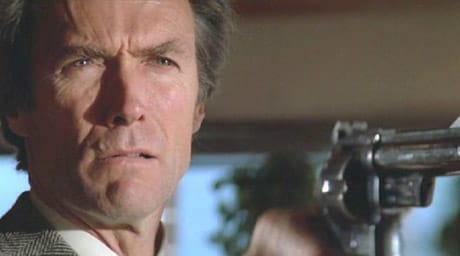Dirty Harry is one of cinema's unlikely venerable characters, a conservative, anti-social, pragmatic, asexual who fights crime like a vigilante on the legitimate side of the law. Harry seems to have been born from a frustration by the conservative right for the ineffectiveness of the increasingly politically correct bureaucracy of the new liberal America. And so, Dirty Harry Callahan, the San Francisco cop who packs a Magnum .44, the most powerful handgun in the world and could blown you head clean off (sorry for the digression), is like the poisoned pill of the police department who exacts vengeance like he's in the lawless West, with his own personal code of justice. But there's a reason why Dirty Harry has persisted in pop culture and is enjoyed by all audiences, both liberal and conservative: Clint Eastwood's immeasurable star power, which cuts through the rather dull investigative plotting of these films. By the time of The Enforcer, it was the third run for Dirty Harry. In most cinematic institutions, we would start to see self-parody and exhaustion in the character. And sure, there are some decreasing returns in enjoyment, but The Enforcer is still a fun romp. Sterling Silliphant's script sings with snappy one liners for Clint, including this film's catch phrase, "marvellous," Harry's rather succinct reaction to the absurdities of liberalism encroaching on his old world ways. Unlike Harry's desperate search for the Zodiac killer in the first Dirty Harry, we don't much care about the investigation in this one. This time round, Harry chases down a group of extreme activists who use terrorism as their primary form of shock and awe. The anchor of this picture is his relationship with a new female partner (played by Tyne Daly), who seems to have been hired by a committee for affirmative action. This type conflict is the stuff great screenwriters hit homeruns with and veteran scribe Silliphant indeed sculpts a solid movie from this dynamic. Sudden Impact, which came seven years later, has a distinct '80s feel to it and is much grimmer and violent, with a dozen or so extremely grisly deaths throughout. Sandra Locke's performance as a rape victim who comes back to town to exact revenge on her assailants is deeply psychological and intense, a stark contrast to Callaghan's bubblegum baddies of the '70s. She is simply fantastic and Oscar-worthy. Impact is also the only entry directed by Clint and his panache behind the camera is evident. Unfortunately, the treatment of race in all these pictures is rather alarming. Black people are treated as threats at every turn. In one scene in The Enforcer, Harry questions the leader of a black militant gang while his female partner waits in another room filled with suspicious-looking African-Americans with surly looks on their faces, implying that the innocent white girl just might get raped. But then again, we have to watch these in the context of its period. Having two of the films packaged as one is a worthy bonus for spending one's hard earned money on an older Blu-Ray title. Special features for The Enforcer include an authentic, rare featurette from back in the day showing Eastwood and his crew behind the scenes. There's also a 30-minute featurette on violence in cinema, as well as astute audio commentary from James Fargo, who got his first break from Eastwood to direct this picture. For Sudden Impact, the audio commentary comes from critic Richard Schickel, and the decent short documentary The Evolution of Clint Eastwood is about Eastwood's transition from actor to director.
(Warner)The Enforcer / Sudden Impact
James Fargo / Clint Eastwood

BY Alan BacchusPublished Jun 17, 2010